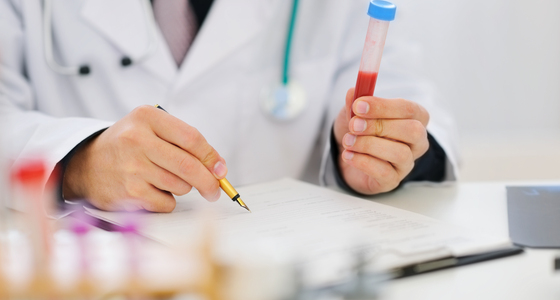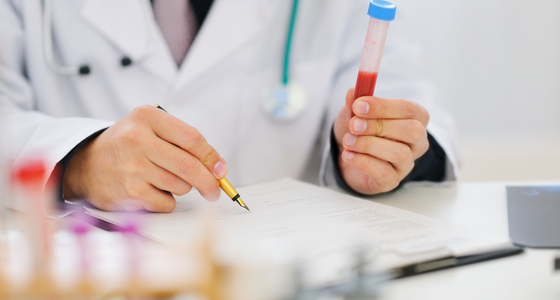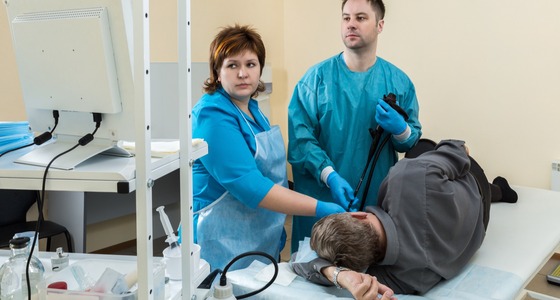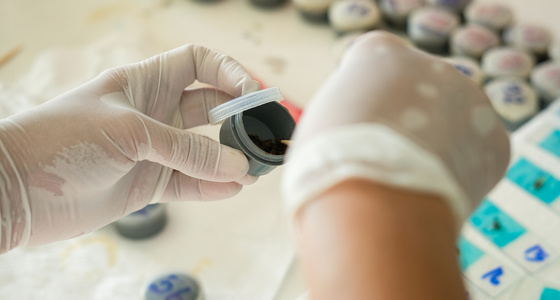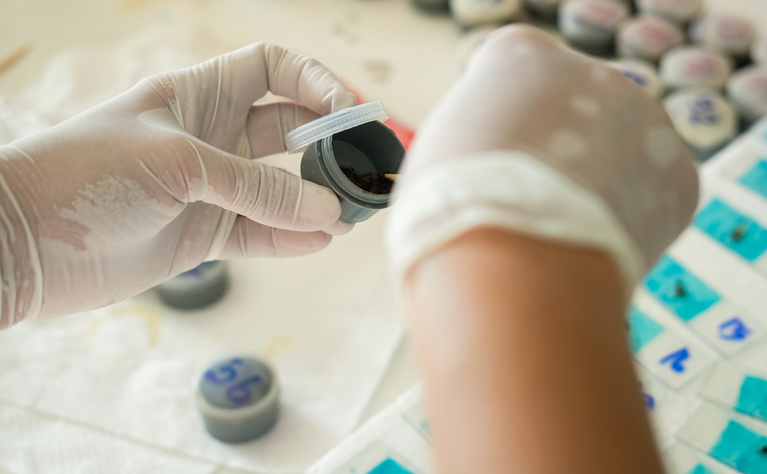
Faecal calprotectin is a test commonly used to diagnose and monitor inflammatory bowel disease. Raised calprotectin levels can also be an indicator of other conditions or problems.
Faecal calprotectin is a substance that your body releases when there is inflammation in your intestines.
Higher levels of faecal calprotectin - which is a protein biomarker - are associated with active inflammatory bowel disease (IBD) such as Crohn's disease or ulcerative colitis. Lower levels of calprotectin could indicate another issue which is causing inflammation (see below).
Faecal calprotectin testing helps clinicians distinguish between inflammatory bowel issues and non-inflammatory bowel issues (such as irritable bowel syndrome (IBS)) of the lower gastrointestinal tract. In recent years it has become a more common way of measuring intestinal inflammation. It is a cheaper and is less invasive test than endoscopy.
Calprotectin testing is now recommended by NICE (National Institute of Clinical Excellence) in the UK as the first test given to someone complaining of changes in bowel habits or bowel-related symptoms.
Calprotectin is measured through a stool sample. Your doctor will give you a vial to collect the stool in. Once you have done the sample it will be sent away to a laboratory for testing.
Calprotectin levels are often measured when someone has gastrointestinal symptoms that may indicate inflammatory bowel disease (IBD) or another GI disorder. Faecal calprotectin is also used in the ongoing monitoring someone who has diagnosed IBD. Some hospitals carry out routine faecal calprotectin tests on their existing IBD patients as a way of monitoring how they are doing while other hospitals just do it if the patient is in a bad flare or if they are undergoing a new treatment/medication.
Faecal calprotectin testing is often used when someone has been experiencing symptoms such as abdominal pain or discomfort, bloating or changes in bowel habits for six weeks or more. Doctors often use it to distinguish between IBS and IBD - IBS patients generally do not have raised faecal calprotectin levels, although this is not always the case.
Elevated levels of faecal calprotectin on their own are not enough to diagnose IBD. Other tests, such as blood tests, scans and/or endoscopies, may also be carried out to aid diagnosis.
The introduction of faecal calprotectin testing means that many fewer people are having unnecessary invasive tests such as endoscopies.
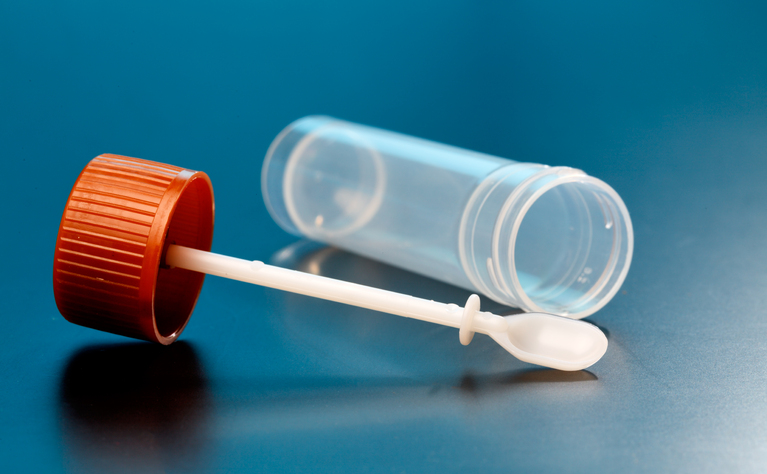
Having a raised calprotectin level generally means you have active inflammation in your body. It is not specific to any one condition, however can be a sign of active inflammatory bowel disease (IBD) such as Crohn’s disease or ulcerative colitis. The higher the level of faecal calprotectin the more inflammation present in your intestines.
Causes of raised faecal calprotectin include:
Things you can do to help support a balanced gut microbiome include eating a diet rich in fruit, vegetables and whole grains, avoiding processed foods, getting regular exercise and managing stress levels. Some people also choose to take supplements that include live bacteria in them, such as Symprove*. Symprove is a water-based supplement that you drink before eating. A research study carried out into the use of Symprove and ulcerative colitis (UC)2. It found that 76% of those with ulcerative colitis taking part in the study had reductions in faecal levels of calprotectin. If you would like to try Symprove you can enter code IBDRELIEF15 at checkout to get 15% off the price of a 12 week course* (we will also receive a commission for your purchase to support our website, but it won't cost you any extra). Other similar supplements come in tablet, powder and other forms of drink. You can find out more about probiotics and IBD in this article.
Most people have some level of calprotectin in their body but when these levels go above what is considered to be ‘normal’ IBD may be suspected. Some people with IBS or other conditions may have levels of calprotectin that are slightly raised above the ‘normal’ level. A faecal calprotectin test on its own isn't enough to diagnose a condition, further examinations will need to be carried out.
The results of a calprotectin test are generally given as a single number. This number is then compared against the cut-off value for the test. If the number is below the cut-off value it is considered a negative, or normal, test. If it is above the cut-off value it is considered a positive, or abnormal, test. In some cases an indeterminate result may be given if the result number is near to the cut-off value and a positive or negative test cannot be confirmed. In these cases the faecal calprotectin test may be repeated at a later date or other diagnostic tests may be carried out.
There are many different manufacturers of calprotectin tests and the cut-off value differs from test to test. The most common cut-off value recommended by the test manufacturers is 50 µg/g for a negative test. A positive test is generally considered to be over 200 µg/g and you will probably need to undergo further testing. Results between 50-200 µg/g are generally considered to be borderline and your doctor may want to wait a few months and repeat the test. Things such as a bacterial infection, an irritated gut lining (due to taking aspirin, ibuprofen or alcohol), some medications or mild diverticulitis could cause a slight elevation in calprotectin levels.
Some people with IBD report having faecal calprotectin levels several hundred, or even thousand, above the positive level.
Yes. Increased levels of faecal calprotectin are associated with lower gastrointestinal (GI) inflammation (small intestine and large intestine). If your levels come back normal you could still have Crohn’s disease in the upper part of your gastrointestinal tract or you could currently be in clinical remission from Crohn’s disease or ulcerative colitis in your lower gastrointestinal tract, meaning there is currently no active inflammation in your intestines. You may have another condition which could be causing your bowel symptoms (such as IBS, coeliac disease or allergies/intolerances).
IBD is a chronic life-long condition which cannot currently be cured. If you have previously been diagnosed with IBD but your faecal calprotectin levels are below normal then it is likely you are in remission and have not been cured.
If you are concerned about symptoms you are having - such as chronic diarrhoea, bloating and/or abdominal pain - you should visit your doctor. They may get you to do a stool test which will measure your level of faecal calprotectin.
There are also some companies that offer private home calprotectin testing to help you distinguish as to whether your symptoms may be due to IBS or IBD or to help you monitor your calprotectin at home.
There are also companies which offer private stool tests - such as Healthpath* - and provide a report about your gut health, taking a look at bacteria, biomarkers and food absorption.
*Please note this is an affiliate link which means if you buy from the company we may receive a commission. You will pay the same price and any commission gained will be used to support IBDrelief's work.
The Gut Microbiota and Inflammation: An Overview. Zahraa Al Bander, Marloes Dekker Nitert, Aya Mousa and Negar Naderpoor. https://www.ncbi.nlm.nih.gov/pmc/articles/PMC7589951/
